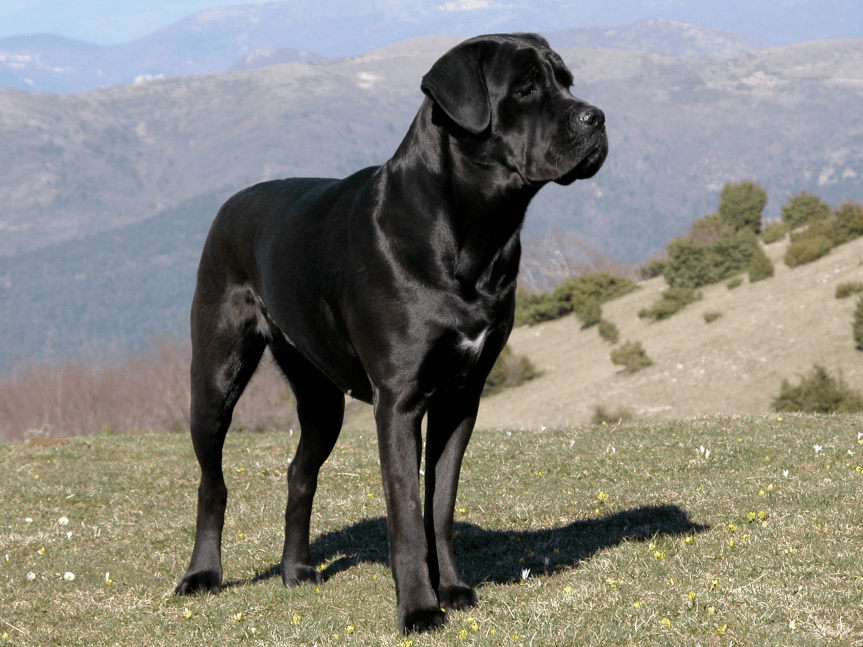Cane Corso

A Cane Corso is reminiscent of a Roman Centurion: commanding and imposing with a quiet air of confidence. These ancient working dogs have excelled at many roles throughout their long history.
While the Cane Corso may give off the appearance of a professional bodyguard, they are also affectionate and are eager to please their humans.
Temperament
Cane Corso are serious dogs, meant for serious dog lovers who want a no-nonsense working dog. They’re naturally strong-willed and confident animals, and any Cane Corso owner will need to be able to match their temperament. While most Cane Corsi will be affectionate toward the humans they guard, they will also naturally try to be the boss of their household. Setting clear boundaries is crucial to living with a Cane Corso. Cane Corso have been bred to work for thousands of years, and that legacy lives on in the modern dogs. They love to work, and thrive on the mental and physical challenges involved. They’re not particularly aggressive, but they are highly motivated and energetic dogs, which can be a lot to handle for a first-time dog owner. One important aspect of the Cane Corso personality is their powerful prey drive. Any smaller animals they see may trigger this drive, and no amount of training will get them to stop chasing. They may not be the best fit for a multi-species household.The Ultimate Guide to Cane Corso
Origins
The origins of the Cane Corso can be traced all the way back to ancient Rome, and possibly even beyond that. Experts believe that the original Cane Corsi were a cross between the extinct Greek Molossus and some unknown fighting dogs from England. The Romans used them as all-around working dogs, though the name Cane Corso translates to “guard of the estate.” Not only were they protectors and guardians, they also saw use as hunting dogs and as companions for the Roman legions. The Cane Corso almost went extinct after World War II, but a slow resurgence starting in Italy in the 1970s has seen the breed come back from the brink. Cane Corsi started being seen in the U.S. in the early 90s, and they are now some of the most sought-after working dogs today.
Key Characteristics of Cane Corso
| Cane Corso | Cane Corso are serious dogs, meant for serious dog lovers who want a no-nonsense working dog. They’re naturally strong-willed and confident animals, and any Cane Corso owner will need to be able to match their temperament.
While most Cane Corsi will be affectionate toward the humans they guard, they will also naturally try to be the boss of their household. Setting clear boundaries is crucial to living with a Cane Corso.
Cane Corso have been bred to work for thousands of years, and that legacy lives on in the modern dogs. They love to work, and thrive on the mental and physical challenges involved. They’re not particularly aggressive, but they are highly motivated and energetic dogs, which can be a lot to handle for a first-time dog owner. One important aspect of the Cane Corso personality is their powerful prey drive. Any smaller animals they see may trigger this drive, and no amount of training will get them to stop chasing. They may not be the best fit for a multi-species household. |
| Exercise Needs | A Cane Corso is a true working dog with the energy and stamina to back it up. Regular daily exercise is vital to burn off all their energy, which will help prevent behavioral issues from developing.
At least an hour a day of exercise in the form of brisk walking or jogging is a good start, and many Cane Corsi may benefit from even more exercise than that. It’s a good idea to invest in dog toys and puzzles that will challenge the Cane Corso even if they don’t have a job to do.
Cane Corso that are mentally and physically stimulated will be much more responsive to obedience training. |
| Cane Corso Grooming | Cane Corsi are low-maintenance dogs, since they were bred to be hardy working animals. Their coat is short and coarse, and generally does not shed excessively.
Day-to-day grooming of a Cane Corso is not especially difficult – typically the only challenge is that the dogs are so large that it takes a significant amount of time to brush their entire body. A large natural bristle brush or dog grooming mit can make this process easier.
Bathing should be done only when necessary, so as to not strip the skin of the natural oils that keep it healthy. Most Cane Corso owners find that a bath every three months or so is more than enough.
Apart from that, normal grooming procedures should apply. A Cane Corso’s nails may wear down naturally if they are getting a lot of exercise, but regular trimming can also be done. Tooth brushing should be done a couple of times a week, if not daily. |
| Cane Corso Training | Due to the Cane Corso’s size and strength, early training and socialization is a must. They are extremely intelligent and need an owner who is able to provide consistent, lifelong training with clear rules and expectations.
Their independent nature and confidence can cause them to think that they know better than their owners. Positive reinforcement is the ideal training method for Cane Corsi, as they must be motivated to follow commands.
Once you’ve found the treat or reward that your Cane Corso prefers, they are generally eager to please and will quickly learn even complicated commands.
Emphasis should be placed on preventing the Cane Corso from leash-pulling, jumping, and leaning on people. They’re heavy and strong, so it may be difficult to train these behaviors out when they’re older. |
| Cane Corso Lifespan And Health Issues | Cane Corsi have an average lifespan for dogs of their size and weight class, living for 10 to 12 years. Cane Corsi may be prone to:
|
| Cane Corso Size And Space Requirements | Cane Corsi are large, physically imposing dogs that were bred to be all-around working dogs and hunters. They stand between 24 to 28 inches at the shoulder, and can weigh from 80 to 120 pounds. Their size and high energy level means they need a significant amount of space to run around and exercise. While they’re adaptable enough to be calm and quiet if living indoors, most Cane Corsi will prefer outdoor accommodations. A sheltered outdoor space will let them stretch their legs and work off their energy as they please, while preventing them from inadvertently knocking over tables, chairs, or other furniture with their massive bodies. That’s not to say that they can’t be kept indoors, as many Cane Corso owners have done so successfully. Just keep in mind the breed’s exercise requirements and need for outdoor activity, as an under-exercised or under-trained Cane Corso may develop destructive behaviors out of boredom. |
Other considerations:
- Cane Corsi are prone to digging when they get bored or anxious. This is less of an issue if they’re kept outdoors.
- While they’re gentle and affectionate towards children, it takes a lot of training and socialization to get them to that point, and any interaction between a Cane Corso and children should always be supervised by the owner.
- Cane Corsos are not especially prone to barking, but they do enjoy vocalizing to their owners and family members with little grunts, whines, and other noises.
How can I take good care of my Cane Corso or Puppy?
Proper socialization
While Cane Corso puppies are not typically aggressive, they require early socialization and training to teach them to be gentle with humans. Their sheer size and strength may cause them to inadvertently cause harm during normal play. While most ethical dog breeders will only release Cane Corso puppies at 8 weeks, it’s still possible to socialize your dog at that age. The period between 8 and 12 weeks is when your puppy learns the most about the world around them. Doing extensive socialization in this period will help ensure that your Cane Corso grows up to be a calm and well-behaved adult dog.
Proper nutrition
Cane Corsos need high-quality, premium dog food to support their large bodies and promote healthy joints. To help prevent upset stomachs and bloat, it’s important to carefully manage your dog’s food intake. A good rule of thumb is to let your Cane Corso puppy eat for 15 to 20 minutes, then take away the excess so that they don’t overeat. You may also consult your veterinarian for more specific nutrition recommendations for your puppy.
Up-to-date vaccinations
Upon taking home your Cane Corso puppy, they will need to get numerous vaccine shots over the next few weeks. Consult your veterinarian for an appropriate schedule and follow it to the best of your ability. Vaccination schedules will vary depending on the prevalence of common transmissible dog diseases in your area.
Most Asked Cane Corso Questions
-
+How Much do Cane Corso Puppies Cost
